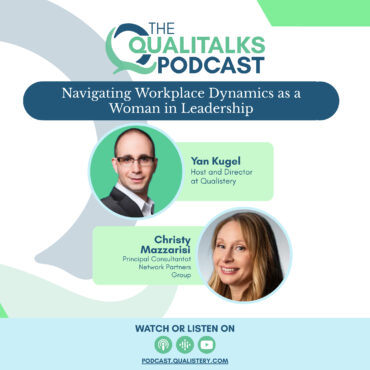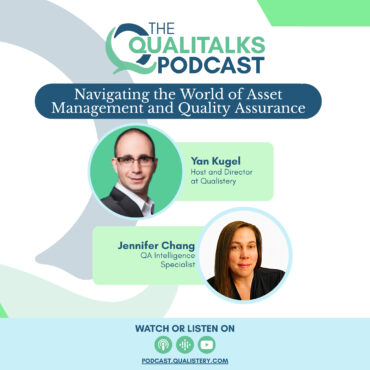
Quality Assurance Philosophy
Paul Palmer and Yan Kugel talked about the quality assurance (QA) and Quality Control (QC) philosophy in organizations. Many companies don’t get it right, and it costs them in compliance, […]
 play_arrow
play_arrow
Agility in Pharma: Transforming Challenges into Opportunities [Elizabeth Hickman] Elizabeth Hickman
 play_arrow
play_arrow
Navigating Workplace Dynamics as a Woman in Leadership [Christy Mazzarisi] Christy Mazzarisi

 play_arrow
play_arrow
The Role of the Qualified Person (QP) Alex Hall
In this episode of the Qualitalks Podcast, Alex Hall and Yan Kugel discuss the crucial role of the Qualified Person in the pharmaceutical industry.
Click here to see some of the asked questions.
Listening to the podcast and reading the article, you will learn:
Watch the whole talk:
Table of Contents
The QP is a unique role for the European Community (EC) and the European Economic Area (EEA), required by the European Directive 2001/83/EC. The QP is the highest authority in the pharmaceutical industry when it comes to releasing or rejecting a batch of a medicinal drug. QPs are obligated to make sure that therapeutic goods don’t reach the market before they verify that the product fulfills all the regulatory requirements: manufacturing, quality control, and marketing authorization. Hence, the QP must have a complete overview of the manufacturing processes and the established quality systems. Moreover, the QP must maintain and develop the system, ensuring a healthy process life cycle.
Here are some of the things that a QP must oversee, according to Alex Hall:
A QP must be ready to take charge in high stakes situations and make hard choices, such as recalling or quarantining a batch. The QP must evaluate the risks of a patient getting the medicine with a defect or not getting it at all. The decision may be different if the remedy is a conventional over-the-counter medicine or a niche life-saving drug. Thus, Before making a decision, the QP must be able to work with a team of experts and take into consideration every point of view, keeping the well-being of the consumer in mind.
The biggest challenge of becoming a QP is becoming all-rounded and knowledgable in all dosage forms and all the different manufacturing types. For example, somebody who has worked years in radio-pharmaceuticals would lack the experience in traditional tablet manufacturing and would have to catch up with that.
Because a QP must be well rounded, having an experienced mentor helps a lot in achieving that. Part of the mentoring process involves simulations and scenarios that train out of the box thinking, preparing people for real-life challenges.
A quality manager who is not a QP will have defined responsibilities, that may overlap with the QPs duties. However, he doesn’t have the legal authority to sign for a final product batch release.
Alex believes that curiosity is the fundamental quality of becoming a QP. That is because a QP must have a broad overview of all the processes and love many different areas in pharmaceutical production. Also, people who want to become QPs must be problem solvers, because they are the ones to whom people always come with questions.
A QP must come from the Quality department, but the way they get there may vary. Anyone can become a QP, whether the person is a pharmacist, works in manufacturing, or quality assurance.
To become a QP, You must possess a university degree in one of the following subjects: pharmaceutical chemistry, medicine, pharmacy, veterinary medicine, chemistry, or biology. However, even if you don’t fulfill those requirements, but can provide evidence for sufficient knowledge that may be enough for the authority.
You also have to work at least two years in a pharmaceutical company, where you must be involved in quality defining activities. If your university courses lasted for more than five years, you might be eligible for a six to twelve months reduction in practical work requirement.
There may be additional requirements from country to country. For more information, you can refer to The QP Association.
https://www.qp-association.eu/qpag_regulations.html
Alex considers those three soft skills as the most vital for the work of the QP:
With enough effort, people can develop those skills, although some personality types may have difficulties with decision making.
The number one advice from Alex is to be curious from the beginning of the carrier. Because the role requires people to be generalists, make sure to visit and learn about every department in your company as much as you can. Also, learn about each product in your company and not only from the manufacturing side. Go deeper, read the patient’s leaflet, and learn about the biochemical functions of the medicine.
If you started your career, not in the quality department, make sure to transfer to it later in your career. That way, you can participate in internal and external audits. If you get the opportunity to audit suppliers, you will get the chance to deepen your knowledge in quality systems, because none is the same. After all, each country may have a different interpretation of GMP.
Last but not least- learn from people around you. Go deep into what they do, and especially into WHY they do it.
Information on good manufacturing practices (GMP) in the life science industry is scattered, vague and poorly organized. We have chosen to solve this problem by organizing the best possible GMP webinars and courses to ensure we deliver all the information you need in a concise, engaging and clear format. All events are free and open to anyone in the industry.
Browse Upcoming Free GMP Webinars
Tagged as: GMP, Pharmaceuticals, Good Manufacturing Practice, QP, Medicine, Qualified Person.
Alex entered the Pharmaceutical industry in 1990, starting out in the analytical laboratories before moving into Quality Assurance, working with major pharma companies including Roche, Eli Lilly, and Eisai. She became a Qualified Person (QP) in 2000. During her career, Alex has supported the training and development of QPs both as a member of the Pharmaceutical Quality Group (PQG) committee and during her nine years as a QP Assessor for the Royal Society of Chemistry (RSC). ⠀⠀⠀⠀⠀⠀⠀⠀⠀⠀⠀⠀⠀⠀⠀⠀⠀⠀⠀⠀⠀⠀⠀⠀⠀⠀⠀⠀⠀⠀⠀⠀⠀⠀⠀⠀⠀⠀ www.qpquandary.com ⠀⠀⠀⠀⠀⠀⠀⠀⠀⠀⠀⠀⠀⠀⠀⠀⠀⠀⠀⠀⠀⠀⠀⠀⠀⠀⠀⠀⠀⠀⠀⠀⠀⠀⠀ www.linkedin.com/in/alex-hall-b6851511

Paul Palmer and Yan Kugel talked about the quality assurance (QA) and Quality Control (QC) philosophy in organizations. Many companies don’t get it right, and it costs them in compliance, […]


Copyright © 2023 Qualistery